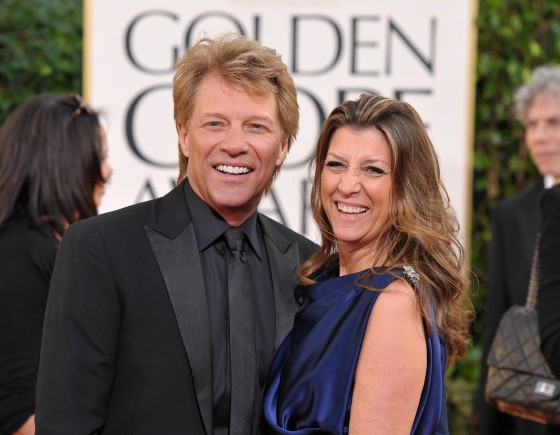“Jon Bon Jovi and Dorothea Hurley Clash with Toms River Mayor: Uncover the Truth Behind Their Bold Stand Against Homelessness Accusations!”

Jon Bon Jovi and his wife, Dorothea Hurley, have long been celebrated for their philanthropic efforts, yet their latest endeavor has sparked controversy and debate. The couple, renowned for their commitment to social causes, recently faced criticism from Toms River Mayor Daniel Rodrick, who accused their JBJ Soul Kitchen soup kitchen of exacerbating homelessness in the area. This accusation has ignited a firestorm of discussion, leaving many questioning the motives and impact of their charitable work.
In a bold and unyielding statement, Bon Jovi and Hurley defended their foundation’s mission, emphasizing their dedication to addressing homelessness through comprehensive solutions. They articulated their vision clearly: “We are committed to ending homelessness through real solutions.
In addition to providing food, the soup kitchen connects people with employment, mental health, and housing services.” This approach reflects a holistic understanding of the complexities surrounding homelessness, aiming to offer not just immediate relief but also pathways to sustainable change.
The couple’s response to the mayor’s allegations was swift and unequivocal. They denied any profit motive and rejected the insinuation that they had received millions of dollars in funding. Instead, they portrayed their work as a genuine effort to effect positive change, free from the taint of financial gain.
Their transparency and openness were underscored by an invitation to the community to engage with their initiatives directly: “We invite the community to take a closer look at our commitment. While some may have opinions, we are working for real change.”

This invitation is a testament to their confidence in the integrity and impact of their work. By encouraging public scrutiny, Bon Jovi and Hurley are challenging critics to see beyond the surface and understand the transformative potential of their efforts. They are not merely providing meals; they are building bridges to employment opportunities, mental health support, and stable housing—critical components in the fight against homelessness.
Despite their clear stance, the controversy surrounding the JBJ Soul Kitchen has raised broader questions about the role of celebrity philanthropy in addressing social issues. Critics argue that high-profile initiatives can sometimes overshadow local efforts or inadvertently create dependency rather than empowerment. However, Bon Jovi and Hurley’s approach seems to counter these concerns by emphasizing collaboration and community engagement.
Their work in New Jersey is part of a larger narrative about the responsibilities and challenges faced by public figures who choose to leverage their influence for social good. The scrutiny they face is not unique, yet it underscores the delicate balance between intention and perception in the realm of charitable endeavors. For Bon Jovi and Hurley, this balance is navigated through transparency, accountability, and a steadfast commitment to their cause.

As the debate continues, it invites reflection on the impact of such initiatives and the importance of understanding the multifaceted nature of social issues like homelessness. Bon Jovi and Hurley’s efforts highlight the need for comprehensive strategies that address not only immediate needs but also the underlying factors contributing to homelessness. Their work serves as a reminder that real change requires more than just resources; it demands empathy, innovation, and a willingness to confront uncomfortable truths.
The couple’s dedication to their mission, despite criticism, is a powerful example of resilience and conviction. Their ability to remain focused on their goals, while inviting dialogue and scrutiny, speaks to their genuine desire to make a difference. In a world where skepticism often overshadows goodwill, Bon Jovi and Hurley’s approach offers a refreshing perspective on the potential for celebrity-driven initiatives to foster meaningful change.
In conclusion, the controversy surrounding Jon Bon Jovi and Dorothea Hurley’s efforts to combat homelessness in New Jersey is more than just a local dispute; it is a microcosm of the broader challenges faced by those who seek to address complex social issues.
Their response to criticism, characterized by openness and a commitment to real solutions, invites us to reconsider the role of philanthropy in society and the ways in which we can all contribute to positive change. As the conversation unfolds, their unwavering dedication serves as both an inspiration and a call to action for those who believe in the power of collective effort to transform lives and communities.

Leave a Reply